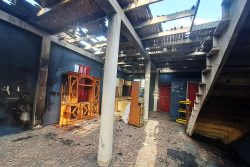President Donald Ramotar has called for the creation of a Central Investment and Export Promotion Agency in Guyana aimed at improving the mechanisms to foster international and regional investments in Guyana.
“I promise to work towards dismantling these obstacles I want to make investments a smooth and seamless process” President Ramotar stated in relation to the current bureaucratic measures which hinder the investment potential in Guyana.
Ramotar said at the launching of the Invest Guyana Magazine at Duke Lodge last evening that he was aware of some of the criticisms investors have when investing in Guyana. The President said that legislation governing the exporting of goods was one such area where “red tape” significantly blocked growth. Ramotar stated that it made little sense to “give people a hard time to export when most countries put in mechanisms to restrict imports”. The President said that the government had to put an end to this and needed to do so quickly.
Ramotar noted that investors are demanding a highly educated workforce and that Guyana needed to step up to the challenge. He said that it was not enough to advance in areas that were labour intensive, but that Guyana had to broaden its information and communication technology sectors. Ramotar stated that over the past ten years the IT sector has created over 3000 jobs. He said that “competitiveness will lead our transformative infrastructure to be complemented by a highly educated and technologically savvy workforce…we need workers with up-to-date skill and expertise especially in relation to information technology and communication technology.” The president said that Guyana had “to be prepared to prepare ourselves to be integrated into the digital community including the regional groupings of South America and Caricom”. He said that Guyana needed to teach Portuguese and Spanish in secondary schools and this decision was addressed in Cabinet meetings. President Ramotar noted that continuous communication with Guyana’s neighbours would ensure critical international investments.
The President stated that the nation’s projected growth of over five percent was directly related to Guyana developing “key and critical infrastructural projects,” such as the Marriott and the Cheddi Jagan International Airport, Timehri expansion. Ramotar said that there remains tremendous investment potential in Guyana in non traditional areas such as tourism. He said that “air transportation remains critical to business activity…we have made official approaches to Air China and two major US airlines to be involved in Guyana’s market in addition JetBlue is awaiting the expansion of the runway at CJIA.”
President Ramotar stated that other infrastructure projects were necessary and that the current administration has realized a need for all-weather roads and deep water harbours. He noted that business can be more readily brought into Guyana if the infrastructure was in place to facilitate movement.
Speaking at the event, Canadian High Commissio-ner David Devine stated that Canada was not “solely interested in the investment of Canadian companies, but the overall investment climate of Guyana”. He said that if the climate was not right then neither partnering countries could foresee sustainable investments.
Devine warned about risky business practices and cautioned that unnecessary risk which comes with a lack of public security was the greatest deterrent to how Guyana’s investment culture is viewed on the international level.
He added “If someone is cheating the systems in one place, you can be sure that somewhere down the line, it results in real losses for you because it will interfere with the natural checks and balances of the market system”. The Canadian High Commissioner stated that all involved parties locally such as the Private Sector Commission and the Georgetown Chamber of Commerce and Industry, had to be prepared to provide an environment with better business practices. Devine said that “we must be prepared for changing environmental conditions, for phenomena such as money laundering and bribery and corruption.”
Devine committed Canada’s continued support in promoting good governance and controlling financial crimes with the proper mechanisms in place at the launching of the annual publication.






